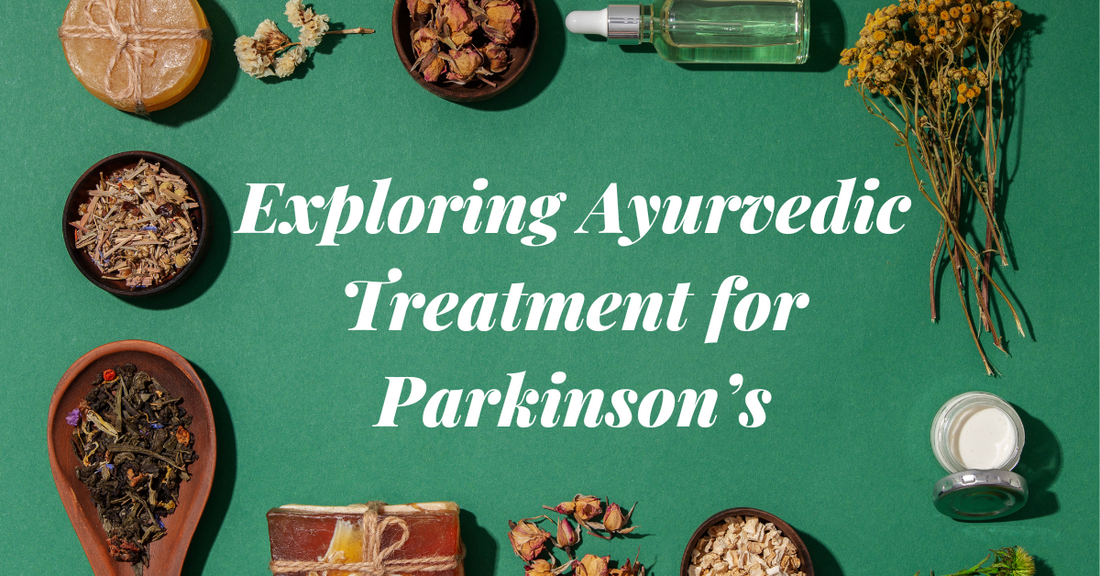
Exploring Ayurvedic Treatment for Parkinson’s
Share
In the quest for holistic wellness, the blending of ancient wisdom with contemporary science often gives us remarkable discoveries. This ancient medical system presents a balance of restoration via herbal remedies, dietary adjustments, and other specialized therapies. Ayurvedic treatment for Parkinson’s is to handle the symptoms by identifying and balancing some imbalances, hence an overall improvement in well-being. Balancing ancient wisdom with modern insights, Ayurveda offers natural ways to enhance quality of life. In this sense, this blog explores how Ayurveda can address Parkinson's uniquely through holistic treatments and therapies.
Table of Contents
- What is Parkinson’s Disease?
- Ayurveda for Parkinson’s Disease
- Understanding Parkinson's Disease Through the Ayurvedic Lens
- Ayurvedic Treatment for Parkinson's Disease: A Multifaceted Approach
- Dietary Therapy:
- Ayurvedic Herbs:
- Therapeutic Practices:
- The Importance of Individualized Care
- Integration with Conventional Medicine of Ayurvedic Treatment for Parkinson's
- Safety Considerations
- Additional Methods for Managing Parkinson's Disease
- Takeaway
- Frequently Asked Questions
- Q.1 Which is the best ayurvedic treatment for Parkinson’s?
- Q.2 Which Pranayam is good for Parkinson’s?
- Q.3 Can Ayurveda cure Parkinson's disease?
- Q.4 How long does it take to see results from Ayurvedic treatment for Parkinson's disease?
- Q.5 Can I combine Ayurvedic treatment with conventional medicine?
- References:
What is Parkinson’s Disease?
Parkinson's disease is a progressive neurodegenerative disorder that affects movement. It occurs when nerve cells in a specific area of the brain called the basal ganglia decompose or die. This part is crucial for controlling movement, and its deficiency leads to symptoms like tremors, stiffness, slowness of movement, and difficulty with balance and coordination. While the exact cause of Parkinson's remains unknown, factors such as genetics, environmental triggers, and age-related changes in the brain are believed to play a role.
Know more about Parkinson’s causes here.
Ayurveda for Parkinson’s Disease

Ayurvedic treatment for Parkinson’s is based on the idea of rebalancing through herbal remedies, dietary changes, lifestyle adjustments, and therapies like Panchakarma (detox) and Rasayana (rejuvenation). This holistic approach deals with the root cause while managing symptoms and enhancing well-being. Ancient practices blended provide Ayurveda as a natural, complementary pathway for improving the quality of life in people with Parkinson's.
Understanding Parkinson's Disease Through the Ayurvedic Lens
In the Ayurvedic system, health is viewed as a balance of three doshas: Vata, Pitta, and Kapha.
In the context of Parkinson’s disease, the focus is on Kapha and Vata. These two govern the motion of the body, and when there’s an imbalance in the vata, it results in the development of the disease.
Ayurvedic Treatment for Parkinson's Disease: A Multifaceted Approach
Ayurvedic treatment for Parkinson's disease aims to restore balance within the body and alleviate symptoms. Through diet changes, herbal remedies, and therapeutic practices, Parkinson's disease could be managed.
Dietary Therapy:
Emphasis on Warm, Cooked Foods: Easily digestible and freshly prepared cooked meals reduce stress on the digestive system and support Vata pacification.
Anti-Inflammatory Powerhouses: Turmeric, ginger, and green leafy vegetables are rich in antioxidants that combat inflammation, a potential contributor to Parkinson's disease.
Moderate Protein Intake: Lean proteins like legumes, poultry, and fish provide essential nutrients for muscle function without overwhelming the digestive system.
Ayurvedic Herbs:

Ayurvedic herbs offer a holistic approach to treating Parkinson's disease, addressing both symptoms and underlying imbalances in the body. Here are specific herbs used in Ayurvedic treatment for Parkinson’s disease:
-
Kapikacchu (Mucuna Pruriens): Balances Vata and supports brain health, which is very important in the management of Parkinson's symptoms.
-
Ashwagandha: This herb has adaptogenic properties that reduce stress, anxiety, and inflammation associated with Parkinson's.
-
Brahmi: Improves cognitive function and memory, which helps in preventing cognitive decline in Parkinson's patients.
-
Turmeric (curcumin): Provides potent anti-inflammatory and antioxidant benefits, protecting brain cells and reducing inflammation.
-
Shankhpushpi: It maintains the functions of the brain, helps to reduce stress, and helps in improving cognitive ability in Parkinson's disease.
-
Medhya Rasayan: A drug prepared with Mandukaparni, Yashtimadhu, Guduchi, and other drugs, used for their neuroprotective and antioxidant activity, thus supporting the progression of Parkinson's disease.
These herbs form the basis of Ayurvedic treatment for Parkinson’s, as they provide holistic support to the symptoms and aetiology of the disease.
Therapeutic Practices:
Panchakarma: This comprehensive detoxification process aims to eliminate accumulated toxins (ama) that can contribute to Vata imbalance. Panchakarma typically involves treatments like oil massage (Abhyanga), herbal steam therapy (Swedana), medicated enemas (Basti), purgation (virechan) and emesis (vaman)
Shirodhara: A relaxing treatment involving a continuous flow of warm oil on the forehead, Shirodhara promotes relaxation and is believed to balance the nervous system.
Nasya (Nasal Therapy): Administering herbal oils through the nasal passages helps clear congestion, enhance cognitive function, and improve overall neurological well-being.
The Importance of Individualized Care
Ayurvedic treatments could be beneficial only if they focus on individual needs. Often, Ayurvedic practitioners consider the patient’s unique constitution, disease severity, and overall health to create a personalized treatment plan. Through this, it is ensured that not only the symptoms are addressed but also the root causes of the imbalances.
Integration with Conventional Medicine of Ayurvedic Treatment for Parkinson's
Ayurvedic treatment for Parkinson’s disease is not supposed to replace conventional medicines. It can be a valuable approach in your wellness routine that can potentially improve your life's quality and reduce the need for medicines. However, it's crucial to consult a qualified Ayurvedic practitioner and keep your conventional healthcare provider informed about any additional therapies you undertake.
Safety Considerations
Ayurvedic herbs are generally safe, but some of them can interact with conventional medicines. Before using any Ayurvedic herbs, you must disclose all your medications to your doctor to avoid any side effects. Additionally, pregnant or breastfeeding women may have to exercise some caution with such Ayurvedic herbs.
Additional Methods for Managing Parkinson's Disease

Living with Parkinson's requires a multi-faceted approach. While Ayurvedic treatment for Parkinson’s is a good foundation, combining additional management techniques can be beneficial in terms of improving the quality of life.
-
Exercise: Regular physical activity helps strengthen muscles, improve flexibility, and enhance balance; therefore, coordination and muscle mass are better maintained. Do at least 30 minutes of moderate-intensity exercise most days of the week, such as brisk walking, swimming, cycling, or dancing.
-
Speech Therapy: This therapy is essential in the management of speech problems, and it teaches techniques that help to improve articulation, volume control, and clarity of speech.
-
Physical Therapy: A customized program designed by a physical therapist helps to improve gait, flexibility, and motion, addressing stiffness and tremors for easier daily functioning.
-
Balance and Gait Training: These exercises help to improve stability, thus reducing the risk of falls and enhancing walking techniques.
-
Deep Brain Stimulation (DBS): For advanced Parkinson's, DBS is the insertion of electrodes to modulate abnormal brain activity to help manage the most severe symptoms.
These are combined with Ayurvedic treatment for Parkinson’s disease.
Takeaway
Even though Parkinson’s disease is a challenging condition, it can be managed through Ayurvedic treatment for Parkinson's, which offers a path towards regulating these symptoms and improving quality of life. Ayurvedic practices restore balance in the body by promoting overall well-being and also empower individuals to lead a fulfilling life.
Frequently Asked Questions
Q.1 Which is the best ayurvedic treatment for Parkinson’s?
There's no single "best" Ayurvedic treatment for Parkinson's disease. The most effective approach is personalized and considers your unique needs. However, panchakarma, a detoxification process, is often a foundational element to eliminating accumulated toxins.
Q.2 Which Pranayam is good for Parkinson’s?
While research on specific pranayama for Parkinson's is ongoing, some techniques may offer benefits. Bhramari Pranayama is a calming breath exercise that involves humming on the exhale. This can promote relaxation and potentially help manage stress, which can worsen Parkinson's symptoms.
Q.3 Can Ayurveda cure Parkinson's disease?
Ayurveda focuses on managing symptoms and improving overall well-being rather than offering a complete cure for Parkinson's disease. However, by restoring balance within the body and addressing the root causes of the imbalance, Ayurveda can significantly improve the quality of life and potentially slow down the progression of the disease.
Q.4 How long does it take to see results from Ayurvedic treatment for Parkinson's disease?
The timeline for seeing results can vary depending on the severity of your condition and your body's unique response to treatment. However, some people may experience improvements within a few weeks, while others may require several months to see a significant difference.
Q.5 Can I combine Ayurvedic treatment with conventional medicine?
Yes, Ayurvedic treatment can be a valuable complement to conventional medicine for Parkinson's disease. It's important to consult with both your Ayurvedic practitioner and your conventional healthcare provider to ensure your treatment plans are compatible.
References:
https://www.ncbi.nlm.nih.gov/pmc/articles/PMC4310928/
https://rjppd.org/AbstractView.aspx?PID=2020-12-4-1
https://adyantayurveda.com/ayurvedic-therapies-for-parkinsons/
https://drdassans.com/ayurvedic-treatment-for-parkinsons-in-india
https://www.sciencedirect.com/science/article/abs/pii/S0378874116305463
